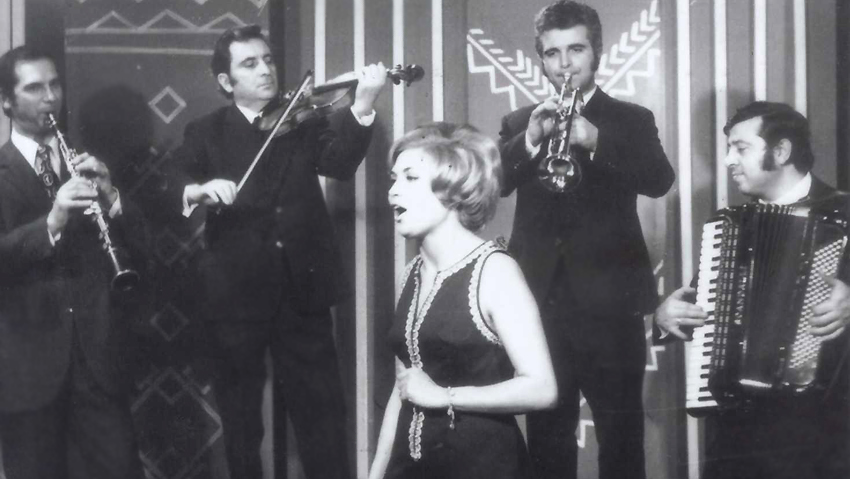“I have been there, mother, I have seen pretty Yambol girls,” goes a song – one of the most famous from the repertoire of Velichka Stambolova. Born in Straldja, near the town of Yambol, she is known most of all for singing songs from the folklore region she comes from. She has been singing since she was a little girl, but she turned to folklore when she was a student of classical music at the Music school in Plovdiv. Having taken note of her beautiful, powerful voice and her open-throat singing, her teachers advised her to join the folk choir with conductor Assen Diamandiev. After just one rehearsal and a lot of hard work at home, she was admitted to the choir. At almost the same time, Radio Sofia (as the Bulgarian National Radio was called then) was organizing a folk song contest. For many years singers and instrumentalists had been selected at these auditions - without the approval of specialists performers could neither give concerts nor make recordings. Here is what Velichka Stambolova remembers from her first meeting with composer and conductor Philip Koutev:
“Before I started singing I told the musicians what key the melody was in. “When did you learn to read music?” – one member of the panel asked me. I said nothing, I had been warned not to. Then that same person told me to sing a rebel song, then a horo and then a ruchenitsa… It was only afterwards I was told this man was Philip Koutev whom I knew only by reputation. I saw from the reaction of the panel members – around 30 in number – that I had been approved. And there were around 750 performers at the audition. Next to Philip Koutev sat Georgi Boyadjiev, head of the Folk Music department of the Bulgarian National Radio, a big name at the time. And I heard them talking where they should send me – whether to the Philip Koutev ensemble or the female folk choir of the BNR. And without being asked, I spontaneously said: “You should send me where I can sing and study at the same time. I still go to school and my father won’t allow me to travel.” The panel members all laughed – my reaction had been childish. That was how I joined the Bulgarian National Radio folk song ensemble. In the summer, when we weren’t rehearsing I would be traveling with different groups, most often with Balkanska Mladost – Balkan Youth – and the dance ensemble of the Students’ home in Sofia. Gradually I was included in the travel programmes organized by the Ministry of Culture. I have worked with many renowned actors, pop singers, conjurors… I have even toured the countries of the former Yugoslavia with the Sofia circus.”

Velichka Stambolova has performed in Belgium, Luxemburg, Holland, Italy France, Spain and many more European countries. She has been on a three-month tour of Canada and has traveled to Africa many times – each time together with groups presenting Bulgaria’s culture and arts. She has won numerous international awards which she has kept to this day. In more recent times she has been awarded at the Bulgarian festival dedicated to different ethnic groups, held in the 1980’s and 90’s. Today she meets often with colleagues from the glorious years of the “heyday of Bulgarian folklore”. And there are many young singers following in her footsteps:
“I am a singer of folk songs from the Thracian region, the place where I was born. I have collected them over the years. I was helped most by my aunt who used to record and seek out more and more melodies. Out of 10, sometimes 20 stanzas I would select the most beautiful and typical lyrics. That is why I am constantly saying that the singers, who have made given folk songs famous have the moral right to call them their own. This is what I explain to young singers – that they must listen to established singers, learn from them but at the same time they must find their own place in music. No one can perform a song from this folklore region the way a singer from this part of the country can – we have all learnt from the source.”
English version: Milena Daynova
Mariyana Dobreva is a singer and songwriter who also plays the guitar in her songs. In the late 1990s, she was one of the founding members of the iconic band ''Siluet''. This spring, as a birthday gift to herself, Mariyana released her original song..
On the occasion of the announcement of a joint candidacy of Gabrovo and Veliko Tarnovo for the European Capital of Culture in 2032, the residents of Gabrovo are reminding us of the common cultural values of the two towns. This will happen along the..
“Who doesn’t know ‘Thracian Dances’? Who hasn’t heard of them?” – we might hear this exclamation from a lover of Bulgarian music, if given the chance to hear just a few bars of the iconic suite. In fact, even those completely unfamiliar with..
On the occasion of the announcement of a joint candidacy of Gabrovo and Veliko Tarnovo for the European Capital of Culture in 2032, the residents of..
Mariyana Dobreva is a singer and songwriter who also plays the guitar in her songs. In the late 1990s, she was one of the founding members of the iconic..

+359 2 9336 661
